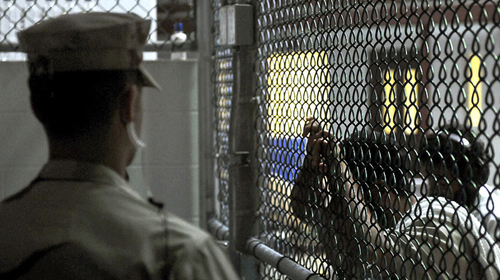
At 9:15 a.m. yesterday morning, the flat-screen monitor in Arlington, Virginia, came to life, revealing a small room inside what appeared to be a temporary structure.
Filling the screen were five men huddled around a small conference table: a translator, the detainee’s two personal military representatives, his long-time personal lawyer, and – seated directly in front of the camera – the detainee himself, Abdel Malik Ahmed Abdel Wahan al Rahabi. Mr. Rahabi has been held at the Guantanamo Bay prison facility without charge or trial by the U.S. government since January 2002.
A disembodied voice announced, both to Mr. Rahabi in Guantanamo and to the viewers in Arlington:
This periodic review board is being conducted at 0900 hours on the 28th of January, 2014, at the Periodic Review Secretariat Headquarters, Arlington, Virginia, with regard to the following detainee: Abdel Malik Ahmed Abdel Wahan al Rahabi…. this is your periodic review board to determine whether continued law of war detention is warranted in your case. Your continued law of war detention will be warranted if such detention is necessary to protect against a significant -- continuing significant threat to the national security of the United States.
Yesterday’s convening was the second tele-hearing to take place before a Periodic Review Board (PRB), a process ordered by the president in 2011 to review whether detainees who were not cleared for release in the administration’s last review in 2010 should continue to be held.
The PRBs are meant to regularly reassess whether release of a prisoner would present a current threat to the United States, but the first hearing was delayed for nearly two years and about 70 cases are still to be heard in the initial round of hearings. PRBs are different from, and do not substitute for, habeas review in federal court, which determines whether detention is lawful.
Importantly, this morning’s hearing was the first to be opened to a small group of outside observers that included media and representatives of human rights organizations. They had access to the unclassified portion of the hearing, which lasted 19 minutes. The observers saw and heard just the opening statements by Mr. Rahabi’s personal representatives and counsel, the text of which had already been posted on the PRB Secretariat website. None of the review board members – representatives from six military, intelligence, and law enforcement agencies and the State Department – asked any questions during the unclassified portion of the hearing.
The move to partially open PRB hearings came as a response to calls from media and human rights groups, including the ACLU, for greater transparency in review proceedings.
Transparency in this process is absolutely necessary so that the public can assess whether the PRB process is meaningful and fair given the lopsided protocols that govern it. The Department of Defense’s procedures decidedly disadvantage the detainee. For example, the PRB can consider evidence the prisoner, his lawyer, and his personal representatives cannot even see. In such an environment, the government must demonstrate that it is not exploiting these kinds of protocols and the absence of procedural safeguards.
Only with that transparency can the public be assured of the fairness of the PRB proceedings. Unfortunately, the 19 minutes of pre-published statements made only one thing clear: we have a long way to go.
Learn more about Guantánamo Bay and other civil liberty issues: Sign up for breaking news alerts, follow us on Twitter, and like us on Facebook.


